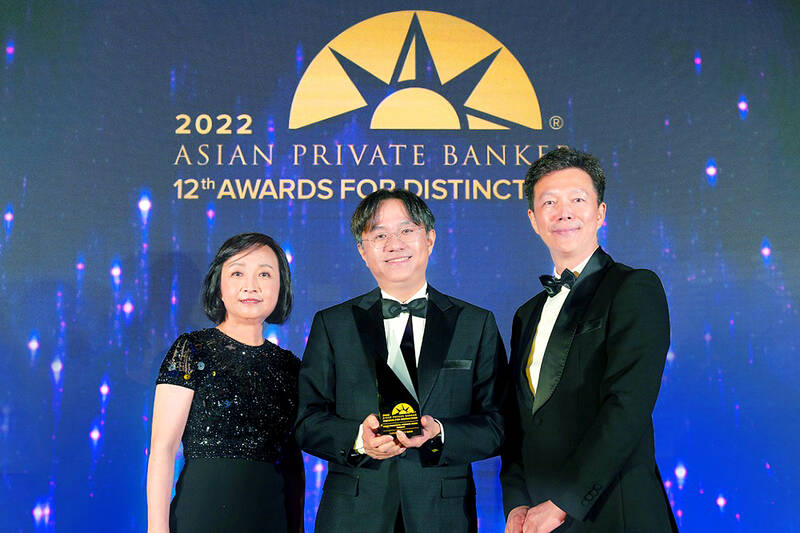In August last year, the Financial Supervisory Commission (FSC) allowed banks to engage in wealth management business for high-asset clients to invest in non-Securities Investment Trust (non-SIT) offshore funds. Starting from this year’s first quarter, Cathay United Bank (CUB) launched the very first non-SIT offshore funds in Taiwan.
For four consecutive years, CUB has been awarded the Best Domestic Private Bank in Taiwan by Asian Private Banker for its excellence in private banking and became the only bank in Taiwan to receive this prestigious accolade.
Unlike traditional investment methods, non-SIT offshore funds allow various channels of investment, including private equity funds and other alternative investments. CUB has provided its clients with numerous investment plan options to arrange and allocate their assets.

Photo: courtesy of Cathay United Bank
According to Fu Po-Sheng (傅伯昇), the CEO of the Cathay United Bank Private Banking, the bond stock and relevant bond markets have continued to be volatile due to the ongoing dual impact of inflation and interest rate hikes. Alternative ways of investment are less affected by the fluctuations in publicly traded market prices such as stocks and bonds, thereby achieving portfolio diversification that reduces investment risk. With diverse strategies, alternative investments can hedge against inflation while pursuing Alpha investment returns. Even with rising interest rates, alternative investments can maintain a robust performance in helping clients to maximize returns.
CUB has established collaborative relationships with a number of world-famous asset management companies. According to Fu, we are now confronted by the global tightening of money supply and slowing economic growth, and so it is crucial to construct investment portfolios for high-asset clients that can reduce risk in traditional equities and bonds. Cathay United Bank Private Banking continues to devote itself to planning alternative ways of investment, designing financial products such as private equity funds to cater to the needs of high-asset clients. CUB’s mission is to offer comprehensive financial market instruments and asset allocation solutions catering to clients’ needs.

Intel Corp chief executive officer Lip-Bu Tan (陳立武) is expected to meet with Taiwanese suppliers next month in conjunction with the opening of the Computex Taipei trade show, supply chain sources said on Monday. The visit, the first for Tan to Taiwan since assuming his new post last month, would be aimed at enhancing Intel’s ties with suppliers in Taiwan as he attempts to help turn around the struggling US chipmaker, the sources said. Tan is to hold a banquet to celebrate Intel’s 40-year presence in Taiwan before Computex opens on May 20 and invite dozens of Taiwanese suppliers to exchange views

Application-specific integrated circuit designer Faraday Technology Corp (智原) yesterday said that although revenue this quarter would decline 30 percent from last quarter, it retained its full-year forecast of revenue growth of 100 percent. The company attributed the quarterly drop to a slowdown in customers’ production of chips using Faraday’s advanced packaging technology. The company is still confident about its revenue growth this year, given its strong “design-win” — or the projects it won to help customers design their chips, Faraday president Steve Wang (王國雍) told an online earnings conference. “The design-win this year is better than we expected. We believe we will win

Power supply and electronic components maker Delta Electronics Inc (台達電) yesterday said it plans to ship its new 1 megawatt charging systems for electric trucks and buses in the first half of next year at the earliest. The new charging piles, which deliver up to 1 megawatt of charging power, are designed for heavy-duty electric vehicles, and support a maximum current of 1,500 amperes and output of 1,250 volts, Delta said in a news release. “If everything goes smoothly, we could begin shipping those new charging systems as early as in the first half of next year,” a company official said. The new

Quanta Computer Inc (廣達) chairman Barry Lam (林百里) is expected to share his views about the artificial intelligence (AI) industry’s prospects during his speech at the company’s 37th anniversary ceremony, as AI servers have become a new growth engine for the equipment manufacturing service provider. Lam’s speech is much anticipated, as Quanta has risen as one of the world’s major AI server suppliers. The company reported a 30 percent year-on-year growth in consolidated revenue to NT$1.41 trillion (US$43.35 billion) last year, thanks to fast-growing demand for servers, especially those with AI capabilities. The company told investors in November last year that